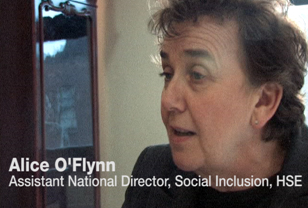Methadone Protocol Review Launch
 In December 2010, the HSE published the Introduction of the Opioid Treatment Protocol, a wide ranging review of the Methadone Treatment Protocol [1998]. The review examines the current regulatory processes and oversight arrangements for opiate dependence treatment in Ireland. It is the first comprehensive external review following a consultation process with key stakeholders. For this feature, we have produced a video covering the official launch of the review report. This video also includes brief interviews with some of the key individuals involved in the review process.
In December 2010, the HSE published the Introduction of the Opioid Treatment Protocol, a wide ranging review of the Methadone Treatment Protocol [1998]. The review examines the current regulatory processes and oversight arrangements for opiate dependence treatment in Ireland. It is the first comprehensive external review following a consultation process with key stakeholders. For this feature, we have produced a video covering the official launch of the review report. This video also includes brief interviews with some of the key individuals involved in the review process.
Minister Pat Carey, TD, Minister for Community, Equality and Gaeltacht Affairs, officially launched the much anticipated document to a crowded room of spectators at the Drug Treatment Centre Board in Dublin City Centre.
Watch the review launch and interviews
Comments
I can think of valid arguments on both sides of this issue. I guess one has to weigh the bad and the good of leiolizatgan. I don’t think that leiolizatgan would eliminate drug-related social problems. Crime related to drug use wouldn’t just go away.If someone steals to satisfy a drug habit under our current drug laws, that person would still probably steal to obtain drugs if they were sold over-the-counter at Walgreens. I do agree that drug addiction is a health issue before it is a criminal issue. The crime follows the addiction, not the other way around. T













